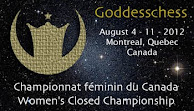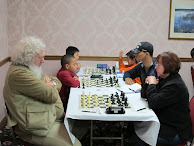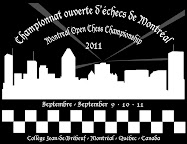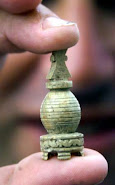Unfortunately, the female players were forced to wear hajib in order to play in Iran. PUKE. Some players sat out, saying no thanks to this woman-hating "custom."
But I'm rooting for Alexandra, a long-time friend of Goddesschess, whoop whoop! She chose to participate, as did many other highly ranked female chessplayers.
FIDE coverage link.
The Semifinal matches of the Women's World Chess Championship started in the Espinas Palace Hotel (Tehran) on February 23.
Four players continue competing for the chess crown: Tan Zhongyi (China) faces Harika Dronavalli (India), and Alexandra Kosteniuk (Russia) meets Anna Muzychuk (Ukraine). These matches consist of two games with the following time control: 90 minutes for 40 moves, then 30 minutes for the rest of the game, plus 30 bonus seconds after each move. If the match is tied 1-1, it is continued on the tie-break with quicker time controls.
The game Tan Zhongyi-Harika Dronavalli was level until move 21, when Harika decided to change the pawn structure, after which Tan Zhongyi got a pleasant King side initiative. It seems Black had enough resources to defend the position but probably Indian player underestimated the danger. White managed to bring all his pieces to organize killing attack on the opponent's King.
Anna Muzychuk tried to surprise Alexandra Kosteniuk by choosing French Defence, the rare guest in her games, but it didn’t work out as former world champion was perfectly ready. Inaccurate 10... Qc7 let White to gain a long-term initiative out of the opening and after 19.Na6 Alexandra Kosteniuk got a position with a pawn up.
After the first time trouble it turned out that White’s win is debatable.
It was not possible to find a non-human line 43.Kg1!! fe 44.Qe5!! with victory and after "normal" 43.Nd4 the character of the game has changed as Black started to create threats against White’s King.
Nevertheless, it looked like Alexandra is not risking to lose this game at any moment but the tables were turned after 56.Ne5? Anna immediately responded with 56...Ng5 and White cannot defend against two threats Re5 with Nf3 and Nh3. A few moves later former World Champion had to resign. In a post-game interview Anna Muzychuk called her victory “a miracle”.
The second game of semifinal will be played at 3 p.m. local time on 24th of February. Alexandra Kosteniuk and Harika Dronavalli will obviously try to equalize the score.
Friday, February 24, 2017
Wednesday, February 22, 2017
Iranian Chessplayer Barred from National Team for Refusing to Wear Headscarf
Teenage Iranian chess master banned from national team for refusing to wear a headscarf
Washington Post
Marissa Payne
February 21, 2017
Washington Post
Marissa Payne
February 21, 2017
To most observers, nothing stood out about Dorsa Derakhshani last month when she competed at the Tradewise Gibraltar Chess Festival. The 18-year-old female grand master fared fine on the board, twice using the Four Knights defense, and looked like any other teenager you might see in the British territory that borders southern Spain.
But to the head of the Iranian Chess Federation, Derakhshani practically committed an act of treason.
Mehrdad Pahlevanzadeh didn’t have a problem with Derakhshani’s play, but her headwear. Derakhshani wore a simple headband in her long hair, instead of a hijab, Iran’s traditional headscarf, which became a compulsory accessory for women after the 1979 revolution. As a result, Pahlevanzadeh announced on Monday that Derakhshani would be kicked off the national team.
Derakhshani’s younger brother Borna, 15, who also entered the tournament, was also kicked off the team. His offense was agreeing to play an Israeli opponent, a strict no-no in the country that doesn’t recognize Israel as a state.
“Unfortunately, what shouldn’t have happened has happened,” Pahlevanzadeh told the semiofficial Fars News Agency on Monday (via Radio Free Europe). “Our national interests have priority over everything.”“As a first step, these two will be denied entry to all tournaments taking place in Iran,” he continued, “And, in the name of Iran, they will no longer be allowed the opportunity to be present on the national team.”
Neither sibling has commented publicly on the news.
That the two young chess masters received such a harsh punishment is not a surprise. Sports in Iran and other parts of the Middle East have long been affected by the region’s strict cultural norms and precarious political stance.
Last year, American chess master Nazi Paikidze did not compete in the chess world championships in Iran because of the country’s requirement that she don a hijab.“Some consider a hijab part of culture,” Paikidze said in an Instagram post announcing her decision. “But, I know that a lot of Iranian women are bravely protesting this forced law daily and risking a lot by doing so. That’s why I will NOT wear a hijab and support women’s oppression.”The hijab made different headlines earlier in the year, however, when U.S. fencer Ibtihaj Muhammad became the first American to win a medal wearing the traditional headscarf. Muhammad earned a bronze in the team saber event alongside hijab-less athletes Monica Aksamit, Dagmara Wozniak and Mariel Zagunis.“I have to challenge this idea that in some way we don’t belong because of our race or our religion,” Muhammad, whose parents converted to Islam before Muhammed was born, said last year.
She added: “Like within any religion, Muslims have conservatives, we have liberals, and we have everything in between. To paint all Muslims with one broad stroke can be frustrating.”
Subscribe to:
Posts (Atom)


































